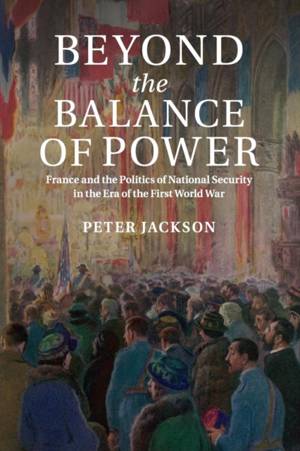
Je cadeautjes zeker op tijd in huis hebben voor de feestdagen? Kom langs in onze winkels en vind het perfecte geschenk!
- Afhalen na 1 uur in een winkel met voorraad
- Gratis thuislevering in België vanaf € 30
- Ruim aanbod met 7 miljoen producten
Je cadeautjes zeker op tijd in huis hebben voor de feestdagen? Kom langs in onze winkels en vind het perfecte geschenk!
- Afhalen na 1 uur in een winkel met voorraad
- Gratis thuislevering in België vanaf € 30
- Ruim aanbod met 7 miljoen producten
Zoeken
Beyond the Balance of Power
France and the Politics of National Security in the Era of the First World War
Peter Jackson
Paperback | Engels
€ 96,95
+ 193 punten
Omschrijving
This is a major study of French foreign and security policy before, during and after the First World War. Peter Jackson examines the interplay between two contending conceptions of security: the first based on traditional practices of power politics and the second on internationalist doctrines that emerged in the late nineteenth century. He pays particular attention to the social and political context in which security policy was made and to the cultural dynamics of the policy-making process. The result is a comprehensive reassessment of France's security policy in the era of the Great War. The book reconsiders the evolution of French war aims and reinterprets the peace policy of the Clemenceau government in 1919. It provides a perspective on the foreign policy of successive French governments in the early 1920s, and also shows that internationalist ideas were far more influential over this entire period than is commonly understood.
Specificaties
Betrokkenen
- Auteur(s):
- Uitgeverij:
Inhoud
- Aantal bladzijden:
- 582
- Taal:
- Engels
Eigenschappen
- Productcode (EAN):
- 9781316635308
- Verschijningsdatum:
- 15/12/2016
- Uitvoering:
- Paperback
- Formaat:
- Trade paperback (VS)
- Afmetingen:
- 152 mm x 229 mm
- Gewicht:
- 766 g

Alleen bij Standaard Boekhandel
+ 193 punten op je klantenkaart van Standaard Boekhandel
Beoordelingen
We publiceren alleen reviews die voldoen aan de voorwaarden voor reviews. Bekijk onze voorwaarden voor reviews.









